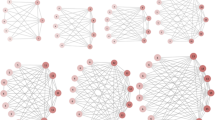Abstract
In this paper we give a partial shift version of user-irrepressible sequence sets and conflict-avoiding codes. By means of disjoint difference sets, we obtain an infinite number of such user-irrepressible sequence sets whose lengths are shorter than known results in general. Subsequently, the newly defined partially conflict-avoiding codes are discussed.




Similar content being viewed by others
References
Bose R.C.: An affine analogue of Singer’s theorem. Ind. Math. Soc. 6, 1–5 (1942).
Chee Y.M., Colbourn C.J.: Constructions for difference triangle sets. IEEE Trans. Inf. Theory 43(4), 1346–1349 (1997).
Chen Z.: Further results on difference triangle sets. IEEE Trans. Inf. Theory 40(4), 1268–1270 (1994).
Chen K., Zhu L.: Existence of \((q,6,1)\) difference families with \(q\) a prime power. Des. Codes Cryptogr. 15, 167–173 (1998).
Chen K., Zhu L.: Existence of \((q, k,1)\) difference families with \(q\) a prime power and \(k=4,5\). J. Comb. Des. 7(1), 21–30 (1999).
Chen K., Zhu L.: Existence of \((q,7,1)\) difference families with \(q\) a prime power and \(k=4,5\). J. Comb. Des. 10(2), 126–138 (2002).
Chen Z., Fan P., Jin F.: Disjoint difference sets, difference triangle sets, and related codes. IEEE Trans. Inf. Theory 38(2), 518–522 (1992).
Chu W., Colbourn C.J., Golomb S.W.: A recursive construction for regular difference triangle sets. SIAM J. Discret. Math. 18(4), 741–748 (2005).
Chlamtac I., Faragó A.: Making transmission schedules immune to topology changes in multi-hop packet radio networks. IEEE/ACM Trans. Netw. 2(1), 23–29 (1994).
Colbourn M.J., Colcourn C.J.: Recursive constructions for cyclic block designs. J. Stat. Plann. Infer. 10, 97–103 (1984).
Fu H.-L., Lin Y.-H., Mishima M.: Optimal conflict-avoiding codes of even length and weight 3. IEEE Trans. Inf. Theory 56(11), 5747–5756 (2010).
Fu H.-L., Lo Y.-H., Shum K.W.: Optimal conflict-avoiding codes of odd length and weight three. Des. Codes Cryptogr. 72(2), 289–309 (2014).
Ling A.C.H.: Difference triangle sets from affine planes. IEEE Trans. Inf. Theory 48(8), 2399–2401 (2002).
Levenshtein V.I., Tonchev V.D.: Optimal conflict-avoiding codes for three active users. In: Proceedings of IEEE International Symposium on Information Theory, Adelaide, Australia, pp. 535–537 (2005).
Massey J.L., Mathys P.: The collision channel without feedback. IEEE Trans. Inf. Theory 31(2), 192–204 (1985).
Momihara K., Müller M., Satoh J., Jimbo M.: Constant weight conflict-avoiding codes. SIAM J. Discret. Math. 21(4), 959–979 (2007).
O’keefe E.S.: Verification of a conjecture of Th. Skolem. Math. Stand. 9 80–82 (1961).
Rentel C.H., Kunz T.: Reed-solomon and hermitian code-based scheduling protocols for wireless ad hoc networks. In: The 4th International Conference on Ad Hoc and Wireless Networks, Cancun, Mexico (2005).
Shearer J.B.: Difference triangle sets. In: Colbourn C.J., Dinitz J.H. (eds.) Handbook of Combinatorial Designs, 2nd edn. Chapman and Hall/CRC, Boca Raton (2007)
Shum K.W., Wong W.S., Chen C.S.: A general upper bound on the size of constant-weight conflict-avoiding codes. IEEE Trans. Inf. Theory 56(7), 3265–3276 (2010).
Shum K.W., Wong W.S., Sung C.W., Chen C.S.: Design and construction of protocol sequences: shift invariance and user irrepressibility. In: IEEE International Symposium on Information Theory, Seoul, Korea, pp. 1368–1372 (2009).
Singer J.: A theorem in finite projective geometry and some applications to number theory. AMS Trans. 43, 377–385 (1938).
Skolem T.: On certain distributions of integers in pairs with given differences. Math. Stand. 5, 57–58 (1957).
Wong W.S.: New protocol sequences for random access channels without feedback. IEEE Trans. Inf. Theory 53(6), 2060–2071 (2007).
Wong W.S.: Transmission sequence design and allocation for wide area ad hoc networks. IEEE Trans. Veh. Technol. 63(2), 869–878 (2014).
Wu Y., Shum K.W., Wong W.S., Su Q., Shen L.-F.: Deterministic channel access using quasi-random protocol sequences. IEEE Trans. Veh. Technol. 63(3), 1467–1479 (2014).
Acknowledgments
The work partially supported by Research Grants Council of the Hong Kong Special Administrative Region under Project 414012 (Y.-H. Lo and W. S. Wong), and the National Science Council under Grants 100-2115-M-009-005-MY3 (H.-L. Fu).
Author information
Authors and Affiliations
Corresponding author
Additional information
Communicated by J. D. Key.
Rights and permissions
About this article
Cite this article
Lo, YH., Wong, W.S. & Fu, HL. Partially user-irrepressible sequence sets and conflict-avoiding codes. Des. Codes Cryptogr. 78, 679–691 (2016). https://doi.org/10.1007/s10623-014-0024-8
Received:
Revised:
Accepted:
Published:
Issue Date:
DOI: https://doi.org/10.1007/s10623-014-0024-8




